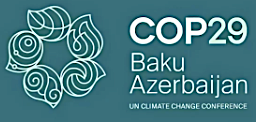(CPO29)
Pope Francis’ Message to the United Nations Framework Convention on Climate Change in Baku
(delivered by the Cardinal Secretary of State, Pietro Parolin, )
[Baku, Azerbaijian, 11-22 November 2024]
“A true ‘ecological debt’ exists, particularly between the global North and South?
The scientific data available to us do not allow any further delay and make it clear that the preservation of creation is one of the most urgent issues of our time.
We must also recognize that it is closely linked to the preservation of peace.
COP29 takes place in a context of growing conditioned disillusionment with multilateral institutions and dangerous tendencies to build walls.
Selfishness – individual, national and of power groups – feeds a climate of mistrust and division that does not respond to the needs of an interdependent world in which we should act and live as members of one family inhabiting the same interconnected global village.
“The increasing globalization of society makes us neighbors, but not brothers” »
Economic development has not reduced inequality.
On the contrary, it has favored the prioritization of profit and special interests to the detriment of the protection of the weakest and has contributed to the progressive deterioration of environmental problems.
In order to reverse this trend and create a culture of respect for life and human dignity. it is necessary to understand that the harmful consequences of lifestyles affect everyone and to shape the future together, ensuring that solutions are proposed from a global perspective, and not simply to defend the interests of a few countries.
May the principle of “common but differentiated responsibilities and respective capabilities” guide and inspire the work of these weeks.
May historical and present responsibilities become concrete and forward-looking commitments for the future, so that a New Collective Quantified Goal on Climate Finance, one of the most urgent tasks of this conference, can emerge from these weeks of work.
Efforts should be made to find solutions that do not further undermine the development and adaptive capacity of many countries that are already burdened with crippling economic debt.
When discussing climate finance, it is important to remember that ecological debt and foreign debt are two sides of the same coin, mortgaging the future.
In this perspective, I . . . ask wealthier nations that they acknowledge the gravity of so many of their past decisions and resolve to forgive the debts of countries that will never be able to repay them.
It is more than a matter of generosity. This is a matter of justice.
Today it is aggravated by a new form of injustice that we are increasingly recognize, namely, that
“a true ‘ecological debt’ exists, particularly between the global North and South, linked to trade imbalances and the disproportionate use of natural resources by certain countries over long periods of time.”
Indeed, it is essential to seek a new international financial architecture that is people-centered bold, creative and based on the principles of equity, justice and solidarity.
A new international financial architecture that can truly ensure for all countries, especially the poorest and those most vulnerable to climate disasters, both low-carbon and high-shared development pathways that enable everyone to reach their full potential and see their dignity respected. We have the human and technological resources to reverse course and pursue the virtuous circle of an integral development that is truly humane and inclusive.
Let us work together to ensure that COP29 also strengthens the political will to direct these resources towards this noble goal for the common good of humanity today and tomorrow.
We must regain our hope in humanity’s ability to “always find a way out, to always redirect our steps, to always do something to solve our problems”.
Our hope [is] that humanity at the dawn of the twenty-first century will be remembered for having generously shouldered its grave responsibilities.
I reiterate the commitment and support of the Holy See in this endeavor, especially in the field of integral ecological education and in raising awareness of the environment as a human and social problem at many levels which requires above all a clear commitment, in which the responsibility, the acquisition of knowledge and the participation of each person are fundamental.
We cannot “pass by and look the other way”
Indifference is an accomplice to injustice.
I appeal, therefore, that, with the common good in mind, we can unmask the mechanisms of self-justification that so often paralyze us: what can I do? How can I contribute?
Today there is no time for indifference.
We cannot wash our hands of it, with distance, with carelessness, with disinterest.
This is the real challenge of our century.


